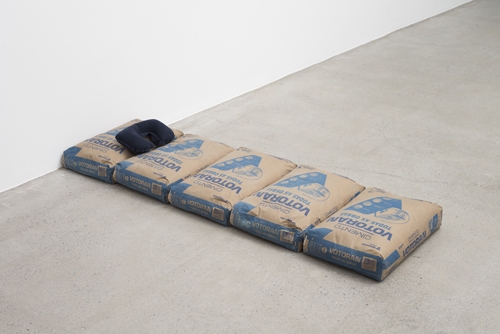Stepping into Pablo Accinelli’s world on a blazing hot morning in São Paulo, one’s immediate, incongruous sensation is that, true to the exhibition’s title, a day is drawing to its close. Near the entrance of the cool gallery space, a slim, delicate polished-steel stand holds a single broomstick (10 cm, all works 2016), its business end missing, as if already unscrewed and stored away.
In an invitation to pause and wipe your feet – to transition from one part of the day’s activity to the next, to shake off the dust – a pair of doormats titled Duración interna (Internal Duration) lie close to one wall, five neat sections cut from the edge of each and attached to their opposite end, so that if each mat were to be curled into a cylinder, the edges would slot together like dovetail joints.
Work is over, say the pieces in this absorbing show by the young São Paulo-based Argentinian artist. Five sacks of concrete lie in a row (Duración interna / Internal duration), a pillow laid on the first like a summons to a construction worker’s siesta.
Time passes, and the sculptures prove it by their incorporation of elaborate measuring and counting rituals: the first broom stand cradles a solo broomstick in a series of 11 steel rings set at 10cm intervals, while another on the other side of the gallery, 20, 25, 50, 100 cm, holds two more broomsticks, one slotting neatly through three rings at 50cm intervals, the other held between two rings set 100cm apart. The mechanistic sense of time that Accinelli sets up, in reference to Henri Bergson’s ideas of durée réelle (affirmed by many of the artist’s titles for the works in this show), sits at odds with a far more subjective sense of time passing.
Time to rest, comes another message from the floor, where the edges of two circular daises are lined with playing cards laid end-to-end in continuous wheels. The surface of one dais is inset with a glass ashtray, while the other has five shot glasses sunk into it, of the kind used in Brazil for sipping cachaça between swallows of beer. Beside them, a newspaper cutting has been scribbled all over in black marker, leaving only the headline, ‘Il mondo cambia’ (‘the world changes’).
But the sense in these works is that it doesn’t change much at all for many; or at least not as dramatically as it is seen to change at the level of global political events. In the languorous world conjured up here, work happens, then you leave and take your leisure. Inertia and motionlessness dominate: in Duración interna (Internal duration), a concrete cylinder is set in a solid white plinth and etched with urgent black arrows, the space between them ingeniously appearing as grey arrows pointing the other way. The arrows beg the viewer to spin the wheel; yet the concrete resists all but the most determined rotation. A fretful stillness permeates 14 works on paper hung along one wall (Frottage: archivo), in which queues of home-time traffic, lit by the glow of hundreds of red taillights, are seen in delicate tracings transferred by frottage from newspaper photographs.
As in most of Accinelli’s work, there’s precision and geometry in every detail, but also warmth, and an inexorable familiarity: a product, perhaps, of the simplicity of the materials and the deep resonance of the dialleddown, late-afternoon atmosphere. A poem by the late Buenos Aires poet Ricardo Carreira is presented on a gallery handout. ‘Baldosas, ciudad, paso, pies, campo, tierra’ (‘Paving stones, city, step, feet, field, earth’, 1996) includes lines like ‘dust, wind, movement’, ‘light, trunk, ground’ and ‘continuation, houses, street’, which conjure a spare, resonant landscape and tap out a rhythm in transitions from city to field and from concrete to earth; from dust on the wind to light slanting onto a tree. In turn, Accinelli’s work zooms in, in steel, paper, concrete, wood and glass, on a similar epochal zone between stages – the traffic lights, the lunchtime siesta, the switch from day to night – that thrums with a powerful poetics of its own.
Originally published in the March 2017 issue of ArtReview
